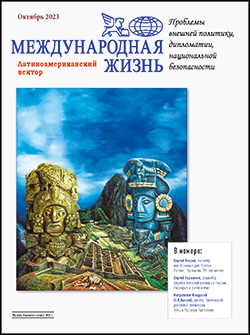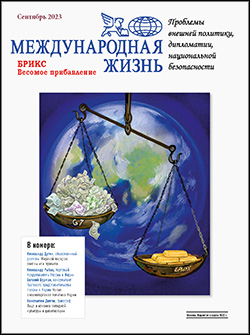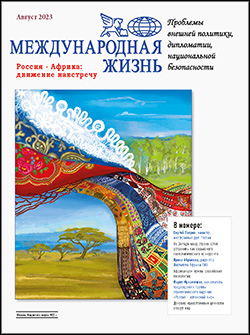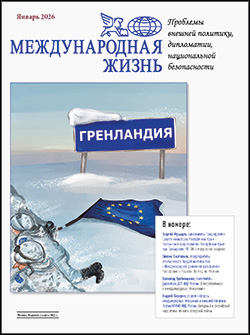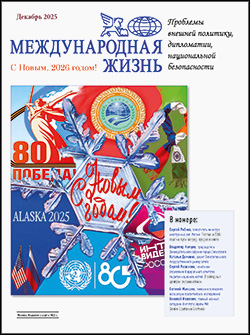100 years of the Russian Foreign Ministry's encryption service
On May 5, 1921, the Small Council of People's Commissars unanimously decided to form a Special Department of the Cheka-GPU under the All-Russian Extraordinary Commission (CHEKA), which was the basis of cryptographic services of many ministries and departments of modern Russia. This date is considered the beginning of the creation of a unified cryptographic encryption service of the country in recent history. Of course, looking back in the past, it should be noted that the formation and history of the state cryptographic service go back centuries and are an integral part of the history of the Russian state itself.
Keywords: 100 years of the Russian Foreign Ministry's encryption service
Igor Evdokimov
Russia and Togo: towards each other
On February 15-17, 2021, the Minister of Foreign Affairs of the Togolese Republic, R. Dusset, paid a working visit to Russia. Within the framework of the visit, full-format bilateral talks with the Minister of Foreign Affairs of the Russian Federation Sergey Lavrov were held in St. Petersburg on February 16. "This is a historic day," the Russian minister said, addressing his Togolese counterpart. "Today we welcome you on the first ever visit of the Foreign Minister of Togo to the Russian Federation."
Keywords: Togo, R.Dusset, intergovernmental agreements, Russia-Africa summit, joint projects
Rakhmatulla Nurimbetov
The role of the SCO in modern international relations: a view from Uzbekistan
June 15, 2021 marks the 20th anniversary of the establishment of the Shanghai Cooperation Organization, which in a relatively short period has managed to turn into one of the most influential multilateral structures in Eurasia. Its formation took place under the influence of cardinal changes in international relations at the end of the twentieth century. Among them are the end of the cold war and a change in the balance of power in the world, the emergence of a new geopolitical situation in Eurasia and the formation of new regional centers of power, the processes of globalization and regionalism, a change in the attitude of the world community to traditional threats
Keywords: SCO, stability and security in Central Asia, SCO transformation, Uzbekistan-SCO
Vasily Dobrovolsky, Oleg Karpovich
Unchanging priorities and new tasks of diplomacy
Today, there are diverse "windows of opportunity" in various areas of international relations, which should be consistently used in the interests of ensuring security, development and prosperity - at all levels of global and regional development of the peoples of the changing world, with the fullest possible consideration of their national interests, within the framework of a joint movement, comfortable and voluntary for each participant.
Keywords: COVID-19, pandemic, polycentricity, deglobalization, multi-vector, digital diplomacy, inclusivity, cyberspace, Russia, actors, international relations
Andrey Baklanov
To save from the Taliban captivity: the experience of practical cooperation with Saudi Arabia on counterterrorism
This year marks the 30th anniversary of the restoration of relations between Russia and the Kingdom of Saudi Arabia. In 1991, the embassies of the two countries began to function, regular political dialogue, trade and economic ties resumed, and, which is very important from the point of view of financial "replenishment" of the budgets of our states, cooperation in the field of oil prices began to be established. However, relations between Moscow and Riyadh after 1991 were, frankly, difficult and uneven.
Keywords: Russia, Saudi Arabia, diplomatic relations, international terrorism
Victor Sumsky
The "Indo-Pacific Vision of ASEAN" and the vertical rise of the US-China contradictions
The aggravation of the US-Chinese rivalry in all its diverse manifestations prompted the leaders of ten Southeast Asian countries to make a joint statement in June 2019 entitled "The Indo-Pacific Vision of ASEAN". In essence, it was an attempt to offer ourselves - and to some extent the whole of modern Asia - a guide to action in a dramatically changing world. In the light of the events and trends of the last two years, the question arises whether this step has justified itself.
Keywords: ASEAN, Asia-Pacific, Indo-Pacific Region (ITR), Indo-Pacifica, Quad, Quad+, US-Chinese contradictions
Vladimir Mikheev
Brexit has opened Pandora's box
A paradox: to some extent, Britain finds itself today in the position of Kemalist Turkey, which chose the "European choice" as a vector of development, but remained flesh of the flesh of an Asian regional power with deep roots in Islamic religious and cultural traditions. Post-Brexit Britain is somewhat reminiscent of post-imperial Turkey, wandering its own special way along the side of the European highway.
Keywords: Brexit, European Union, Northern Ireland, USA/Britain and NATO
Alexey Kuznetsov, Viktor Pischik
The impact of financial globalization on the formation of the European Economic and Monetary Union
In the context of financial globalization, international financial markets have had a strong impact on the traditional structure of corporate governance in Europe, which was reflected in the strengthening of the work of European companies with private investors, the reorientation of income policy to obtain short-term profits in the capital market, bringing accounting practices in line with Anglo-American financial reporting standards, and so on.
Keywords: European continental model, Anglo-Saxon model, financial globalization, neoliberalism, European Economic and Monetary Union, the center and periphery of the euro area, the international role of the euro, unconventional monetary policy of the ECB, international liquidity, global financial market, Anglo-American business standards
Andrey Naryshkin
The role of economic diplomacy in the system of international relations
Understanding the history of the formation of the modern system of international relations, for which humanity has paid with bloody wars and many lives, leads us to the idea of the importance of the level reached, allowing conflicts to be resolved in the most peaceful ways. The fundamental element of the modern system is precisely diplomatic methods of resolving disputes between Powers, as well as the prevailing economic agenda and economic measures of struggle. These circumstances indicate the need to strengthen work, especially on the development of tools that allow ensuring the interests of the domestic economy by diplomatic methods.
Keywords: system of international relations, economic diplomacy, international legal order, Westphalian system, Vienna system, Versailles-Washington system, Yalta-Potsdam system
Oleg Vishlev
1941: disinformation operation of Nazi Germany to disguise the preparation of an attack on the USSR
What explained Stalin's certain indecision in the last peaceful hours of June 21, 1941? What was hidden behind the phrase dropped by him, according to Zhukov, "Maybe the issue will still be settled peacefully?" Did he really hope that the war with Germany could still be prevented and negotiated with the Germans? No, Stalin never believed in Hitler's friendliness, and even more so at the moment when the Germans pulled a multimillion-strong army to the USSR border, recalled their specialists, began evacuating the staff of the German embassy in Moscow, and burning documents in the embassy itself. And yet, why did he delay at a critical moment?
Keywords: Germany, Great Britain, Middle East, Soviet agent network, disinformation operations
Читайте другие материалы журнала «Международная жизнь» на нашем канале Яндекс.Дзен.
Подписывайтесь на наш Telegram – канал: https://t.me/interaffairs

 12:20 21.04.2021 •
12:20 21.04.2021 • 